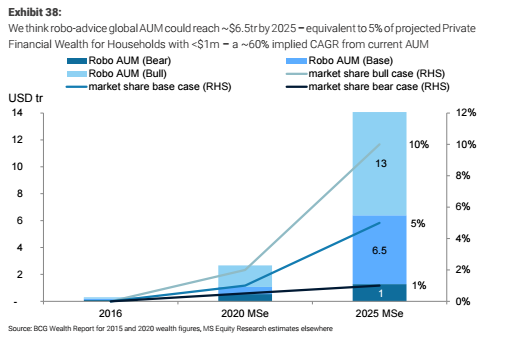A lot of robo-advice startups could be heading for trouble.
Robo-advisers provide financial advice or portfolio management online or via a smartphone application. Rather than using human managers to build portfolios, they use algorithms to determine where to invest.
Global assets managed by robos could reach $13 trillion by 2025 in a best case scenario, according to a group of equity analysts at Morgan Stanley. That’s up from $100 billion as of December 2016.
But while robo pioneers Betterment, Wealthfront and Nutmeg have been growing at a fast clip, it’s actually the legacy firms such as Vanguard and Charles Schwab that will drive growth in the robo-advice space moving forward, according to Morgan Stanley. Schwab already has close to $50 billion in robo assets, up from $4.2 billion in 2014.
"[W]e think the incumbents are best positioned to win market share, and we see the fact that ~70% of the companies we interviewed either just launched or are about to launch such offering as a step in such direction," the bank said.
That's because legacy firms have their brand names to back them up. A lot of investors, especially high-net-worth investors, are more comfortable giving their money to a well-established Wall Street firm than to a young startup from the Valley.
"The case of Vanguard and Schwab has showed that network and brand are key to lower cost of acquisition, and allow for faster expansion," the bank said.
But this doesn't mean the bank thinks the end is nigh for all robo-advice fintech firms. They believe a "handful" will survive, but most will have to partner up with other startups or get bought out by incumbent firms.
This consolidation is already underway. TIAA, a New York-based financial services firm, bought the business-to-business robo-adviser MyVest in 2016. In the same year, Invesco, a legacy investment management firm, bought Atlanta-based robo-adviser Jemstep.
Robo-advice startups, you've been warned.

